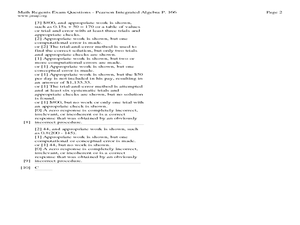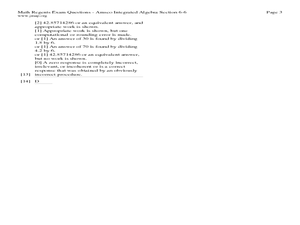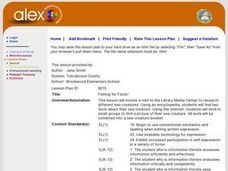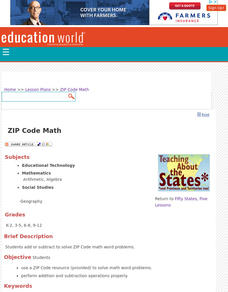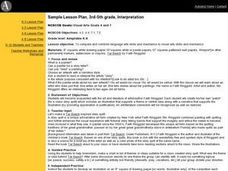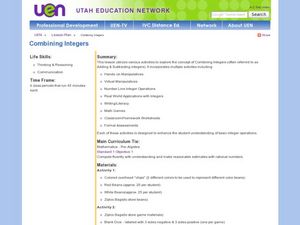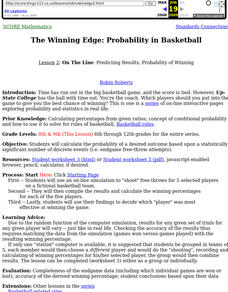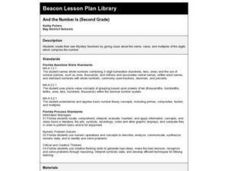Curated OER
Child Labor during the Industrial Revolution and Now
Fifth graders research topic of child labor by studying Industrial Revolution, read about child labor laws, and examine countries where child labor still exists today. They then choose single question to research from list, and create...
Curated OER
Proportions and Percents
In this Algebra I activity, 9th graders use proportions to solve problems involving percents. The one page activity contains a combination of ten multiple choice and free response problems. Answers are provided.
Curated OER
Percent and Percentage Problems
In this Algebra I/Algebra II worksheet, students solve application problems involving percents, percent error, and percent of increase or decrease. The two page worksheet contains a combination of fourteen multiple choice and free...
Curated OER
Thanksgiving Acrostic Poems
Students watch streaming video, Holiday Facts and Fun: Thanksgiving, define and discuss acrostic poetry, complete circle map using words associated with Thanksgiving, and create acrostic Thanksgiving poems to be typed in Microsoft Word...
Curated OER
Punnett Squares
Eighth graders take a short quiz on genotypes and phenotypes. As a class, they are introduced to the concept of Punnett Squares and listen to a description of Gregor Mendel's pea experiment. In groups, they complete Punnett Squares to...
Curated OER
Fishing for Facts!
First graders visit the library or media center to research sea creatures using encyclopedia. They find two facts and research the Internet to find a picture of the sea creature. They create a class sea creature booklet.
Curated OER
Heads or Tails
Seventh graders compare experimental and theoretical probabilities. In this comparing experimental and theoretical probabilities lesson, 7th graders discuss the theoretical probability of flipping a coin. Students flip a coin...
Curated OER
How Does Chance Influence Inheritance?
Students complete a lab based on how chance affects which genes appear in gametes as in Mendel's Law of Segregation. They review the theories, vocabulary words, and historical background of Gregor Mendel's work with pea plants. They...
Curated OER
ZIP Code Math
Students add or subtract to solve ZIP Code Math word problems. A ZIP Code Math work sheet is included. This lesson combines math with geography quite nicely.
Curated OER
Leprechaun Dust
Learners make "leprechaun dust" in this short art instructional activity using Jello instant pistachio pudding, small jars, milk, and spoons. Ideal for celebrating St. Patrick's Day with early-elementary students. Can be combined with...
Curated OER
Money
Second graders show combinations for $1.00. In this dollar combinations lesson, 2nd graders use nickels, dimes, and quarters to model and count combinations equaling $1.00.
Curated OER
Combining Technology with Literature
Students develop a picture using the computer with an education computer program. For this technology lesson plan, students draw a picture on the computer based on a book that they have read.
Curated OER
Encouraging Writing Through Combined Photos
Students practice writing skills through using photography to help create a writing prompt. They investigate how images can be used to create new ones that related to each other. This is similar to making a collage except now the images...
Curated OER
Sample Lesson Plan, 3rd-5th grade, Interpretation
Students become acquainted with the art and literature of artist/author Faith Ringgold.
Curated OER
Combining Integers
Seventh graders explore the concept of adding and subtracting integers. For this adding and subtracting integers lesson, 7th graders use white and red beans to demonstrate adding and subtracting integers. Students play an on-line game...
Curated OER
Using Standard Deviation, part 2
High schoolers explain and learn the practical application of standard deviation. They compare cities in the U.S. and discover whether cities closer to the ocean have more consistent temperatures. Useful resources are given.
Curated OER
Spelling Connections Grade 6: Words With "graph"
In this spelling worksheet, students read ten clues to words with "graph". Students fill in the missing letters to complete the spelling words. There is no word list.
Curated OER
The Winning Edge: Probability in Basketball: Lesson 2
Students calculate the probability of a desired outcome based upon a statistically significant number of discrete events (i.e. endgame free-throw attempts). They participate in an online simulation of basketball free throws.
Curated OER
And the Number Is (Second Grade)
Second graders create Mystery Numbers. They give the class clues about the name, value, and multiples of the digits which make up the number.
EduGAINs
Go Eco! Ecosystems
How is a movie theater like a desert biome? Compare systems to ecosystems with a set of activities that focuses on accessing multiple intelligences and building upon knowledge. As learners discuss the ways elements of an ecosystem depend...
Aquarium of the Pacific
Lego Molecules
Young scientists construct an understanding of molecular compounds in this hands-on science lesson. Using LEGO® to model the atoms of different elements, students build molecules based on the chemical formulas of common compounds.
Arizona Department of Education
Area and Perimeter of Regular and Irregular Polygons
Extend young mathematicians' understanding of area with a geometry lesson on trapezoids. Building on their prior knowledge of rectangles and triangles, students learn how to calculate the area of trapezoids and other...
American Farm Bureau Foundation for Agriculture
Shapes in Agriculture
It's time to get crafty with shapes! Your future farmers demonstrate their geometric ability by building a farm using triangles, circles, rectangles, and squares. But first, scholars take part in a brainstorm session inspired by their...
Federal Reserve Bank
Less Than Zero
Perry the penguin wants to buy a new scooter, but he doesn't have any funds! Walk your kids through the short book Less Than Zero, and have them track his borrowing, spending, and saving on a line graph while you read. Pupils will learn...

